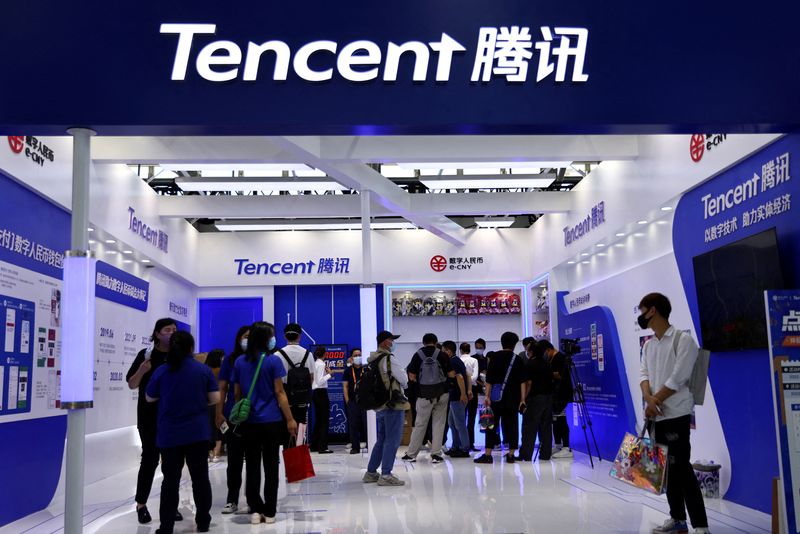By Josh Ye
HONG KONG (Reuters) -China's Tencent Holdings (OTC:TCEHY) posted a weaker-than-expected 7% rise in fourth-quarter revenue on Wednesday as its gaming revenue shrank, and said it was expecting to at least double its share buybacks this year.
The world's largest video game company and operator of the WeChat messaging platform reported revenue of 155.19 billion yuan ($21.56 billion) for the three months ended Dec. 31. That compared with the 157.2 billion yuan average of 23 analyst estimates compiled by LSEG.
Tencent's core gaming business suffered a notable slowdown in the fourth quarter. Gaming revenue in China declined 3% to 27 billion yuan, while international gaming revenue increased only 1% to 13.9 billion yuan, or declined by 1% when excluding currency fluctuations.
The company also said intends to at least double the size of its share repurchases from HK$49 billion in 2023 to over HK$100 billion ($12.78 billion) in 2024. Its shares had fallen some 16% over the past year to Tuesday's close.
In a call with media, Tencent president Martin Lau said the company saw a slowdown in gaming revenue last quarter partly because many zealous gamers had already spent on their games in the first quarter last year when China moved to lift all COVID-19 restrictions.
As a result, Lau said the company's gaming revenue in the first quarter this year will also be soft as compared with last year.
But he said that Tencent has a pipeline of new games to boost its domestic revenue. Most notably, Lau said the company plans to release its "Dungeon & Fighter Mobile" in the second quarter which JP Morgan analysts estimate can bring in 3 to 4 billion yuan of revenue.
For all of last year, Tencent’s revenue rose 10% to 609 billion yuan, trailing expectations of 612.2 billion yuan.
Still, this marks a year of recovery for Tencent, which reported its first annual revenue decline in 2022 as it was hit by Beijing’s sweeping crackdown on the tech sector. By comparison, it saw revenue growth in every quarter last year.
Revenue from online ads rose 21% to 29.8 billion yuan as the Shenzhen-based giant continues to expand its ad distribution capability.
Revenue from fintech and business services grew 15% to 54.5 billion yuan as the firm continued its expansion in those areas.
Net income for the quarter declined 74% compared with the same period last year, but the decline was attributed to Tencent's sale of its stake in food delivery giant Meituan.
Excluding the impact of investment-related transactions, Tencent said its quarterly profit grew 44% year-on-year to 42.68 billion yuan.
In a later call with analysts, Lau was asked about China's potential new rules on the gaming business this year, the draft version of which spread massive panic in December when it was first revealed by the government.
Lau said the rules will not impact Tencent, adding that the market overreacted to the rules.
"It's no longer our concern," Lau said, "The truth is we are actually very encouraged by the supportive measures that were unleashed [by the government] after the initial concern was expressed by the market."
He also said players on average already spend less on Tencent's games as compared to other products on the market. As such, if there would to be rules setting limits on player spending in video games, it would have limited impact on Tencent's games.
Lau also highlighted AI as a focus for Tencent. Lau said Tencent's AI model "Hunyuan", which delivers top-tier Chinese language performance, has been scaled up to reach a trillion-parameter scale. The number of parameters is often used by the tech industry to measure the strength of a given AI model.
Lau said Tencent's advertising business will be the first to benefit from the deployment of its AI model. At the same time, Tencent is also integrating AI "copilot services" to products like Tencent Meeting and Tencent Docs.
Lau added that a key focus for its model this year will be on improving the text-to-image and text-to-video capability.
"The next important evolution is actually what we have seen with Sora," he said, referring to OpenAI's powerful AI video generator, "This is something that which we would be developing in the next turn."

($1 = 7.1995 Chinese yuan renminbi)
($1 = 7.8230 Hong Kong dollars)